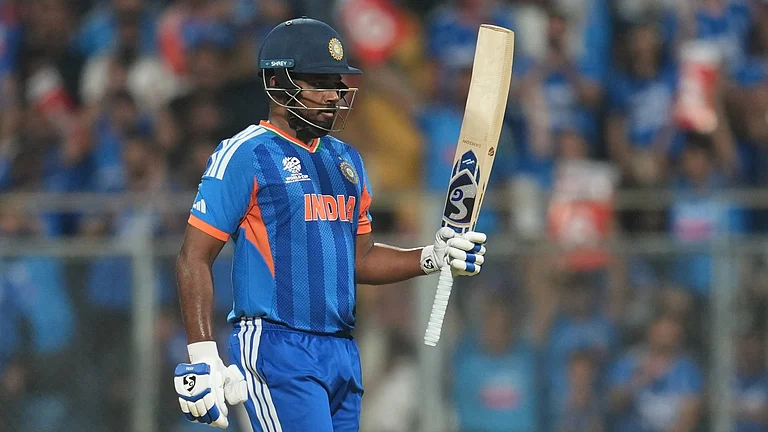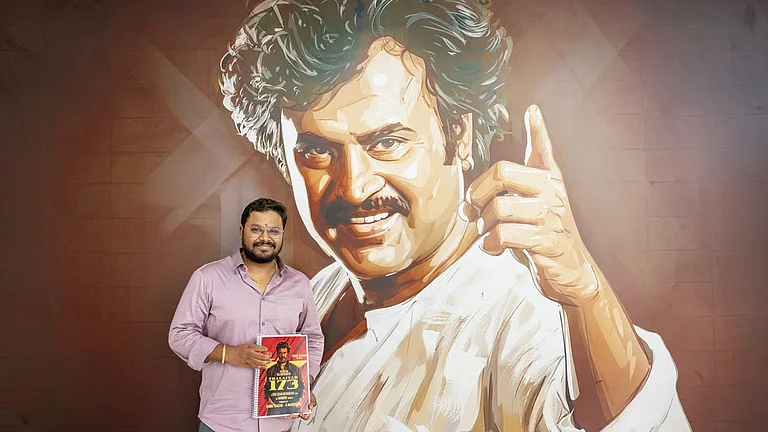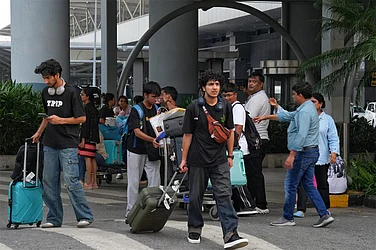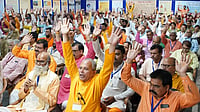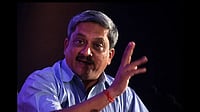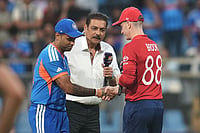Every monsoon, the Chapora river claims a little bit of Revora, a village you may not have heard of in North Goa. For years, hundreds of migrant workers from Odisha, Karnataka and other north Indian states marshalled by their native overseers, have dredged sand out of the riverbed to add grit to the state’s booming real estate industry.
The hollowed bed of the river has now led its banks to crumble bit by bit, consuming a few yards of earth and a few coconut trees every year during the rainy season.
The village is populated by a few hundred houses, temples, the main church and rows of huts along the river, where the tired sand extractors stretch out at night after a day’s labour. The rows of huts have swelled as the quantum of sand extraction increased over time to fuel the construction of a few more villas and housing complexes along Goa’s coastline.
Barring the obvious tragedy of land loss, in many ways, Revora is still a slice of Goa which makes for a stunning holiday postcard. But it is in villages like Revora, where eroding land and eroding identities converge, that Manoj Parab has been finding traction for his ‘revolution’.
The 37-year-old post graduate in Geology heads a political outfit called the Revolutionary Goans Party (RGP), which contested in 38 out of the 40 state assembly seats that polled on February 14.
For the five years since RGP was founded, the geologist in Manoj has been sounding the depth of Goa’s identity issues, which he claims has paved the way for the politician to emerge.
I met Manoj in Revora, one of the many villages which make up the Tivim assembly seat where he is contesting from. After fixing a meeting over the phone, I walked into a newly constructed house crammed mostly with young, tired men; some lying sprawled, others squatting on the floor nursing a hot cup of tea. There were just two young women in the group. An elderly lady of the house was serving strong milk tea with freshly made pole, a thin, fried bread made of fermented rice.
Manoj was sitting on the floor, resting against a sofa, on the other side of the packed room. He is shorter than your average Goan. His slight belly, an average Goan rice-fed physical feature, bulges over his waistline just a bit. His ambition, as founder of an organisation he claims has around 50,000 registered members, belies his appearance. “Over the last five years, we have been working closely with Goans, understanding their issues, raising a voice against injustice, fighting for the rights of Goenkars in their own state. Now, it is time for every niz Goenkar (native Goan) to unite as one and join us in this fight to save our identity and existence,” reads the lead paragraph of RGP’s election manifesto.
ALSO READ: Federalism And The Idea Of Regionalism
In course of the interview, Manoj spoke about the circumstances that led to his founding the political party. Early on in his story, there’s little to distinguish him from the thousands of youngsters from lower middle-class backgrounds who pass out of Goa’s colleges.
Manoj was born in Pirna village near Revora. He studied at a Catholic school nearby, before completing his graduation in Geology from a college in Panaji. Geology is a sought-after stream for science graduates in Goa because of the job opportunities it opens doors to in the state’s mining sector. After post-graduation, he tried his hand at working in companies owned by local mining barons like the Timblos, Salgaocars and Vedanta Resources. He later migrated from Goa in search of a better pay package and ended up working in oil rigs off Mumbai and Gujarat.
It is a regular, unremarkable story. The Catholic school education, followed by graduation in local colleges and migration out of Goa for employment is the trajectory followed by many aspirational youngsters in Goa. It’s that boy-next-door story that has made Manoj’s political pitch believable to his growing band of followers.
“My father was in the business of repairing and crafting tablas. We were staying on rent for almost 20-25 years in Colvale village. Then we moved to Bicholim, where we had our own flat. That is the saddest part. Whenever I speak about my story, it relates to many Goans, because as Goans we cannot buy property. Instead, we have to stay on rent or just move places,” he says.
Manoj’s rise in politics over the last five years has coincided with the erosion in the faith of Goan voters in conventional political parties, amid unparalleled levels of corruption and defection and the erosion of the state’s unique social and cultural identities, which run the risk of being relegated to the status of a myth.
Theoretically, Goa’s identity debate could stretch back to the legend of warrior sage Parshuram reclaiming Goa from the seas by shooting an arrow that pushed the waters of the Arabian Sea back to the horizon. The popular upper caste legend about the formation of Goa marginalises and virtually negates the identities of native tribesfolk who toiled the land.
ALSO READ: Renegotiating India’s Federal Compact
The birth of a new identity invariably comes at the cost of a culture that is pushed to the backdrop. The birth of Goa’s unique cosmopolitan identity over the last three decades has come at the cost of a gradual withering away of the region’s own recent identity, accrued from half a millennium of forced cohabitation of the coloniser with the colonised. As a Portuguese colony, Goa was referred to as the ‘Rome of the East’. In a few years from now, the coastal state could well be dubbed ‘Greater Kailash with sea view’, due to the significant investments in real estate by the upper crust from the national capital and other Indian metros.

This identity change, which RGP aims to resist, has not occurred in isolation. Goa’s immigration trail to the Gulf, North America and various parts of Europe under a special concession by Portugal, has been a well-trodden thoroughfare for decades. The gap left by the exiting manpower has been filled by another set of migrants.
Out of the state’s nearly 15 lakh population, 18.5 per cent are migrants from other Indian states, according to the 2011 census. The last 10 years may have necessitated an even larger number of migrants into Goa to fuel the state’s tourism, service and real estate sectors, which have grown exponentially over the decade.
However, these numbers, cached in neat rows in a survey document, have translated into anxiety in Goa’s villages, where traditionally named waddos or wards have been rechristened with non-native names such as ‘Lala ki Basti’, an area dominated by migrant voters in Tivim constituency.
“There has been a key change in most villages. Goan villages had a sense of ethos. We had some identity. But now, what is happening is that migrant influx in Goa has increased so much that every village has a 30 to 40 per cent migrant vote-bank. Most of them stay illegally in rented rooms or in communidade (ancient community land bank) lands,” Manoj says.
Early on in its innings as a political party, the RGP had embarked on a mission to track down “suspicious” voter IDs issued in the state. Manoj claims RGP teams tracked down 2.5 lakh dubious cards, of which their intervention led to the cancellation of around 50,000-60,000.
“There are many more. There are people with two voter cards, others whose cards are suspicious. Then there are multiple cards issued against a single house address. There are many discrepancies in the muster rolls. That needs to be cleared, because right now, we are not selecting our government or electing our MLAs or elected representatives. Migrants with illegal voting cards are doing that. This needs to stop,” Manoj said.
He however steers clear of a parallel between RGP and a young Shiv Sena of the late 1960s, which had raised a similar anti-migrant pitch. “This is totally a different thing. This is a revolution, where we believe in empowering locals. It is not against anyone. That (Sena) movement was against (a set of people),” he said.
With its ideology appealing to youngsters, RGP has been predictably aggressive on social media. In its early days, videos of Manoj and his team members picking on and heckling non-native hawkers ‘illegally’ selling wares along roads were the signature feed.
Manoj’s early popularity can also be credited to his observance of a name-calling culture, damning tainted politicians by name and often referring to them as ‘dogs’ or ‘thieves’. The ‘bold’ slander widened his acceptance among both frustrated youth in Goa and expats abroad, a large section of whom are his prime backers.
Pressures of mainstream politics, though, appear to have dulled that coarse facet of his personality. Manoj now claims that RGP also draws support from legal migrants living in Goa. “There are many who support us. Many have helped with inputs for our vision document. There are many who campaign for us in their areas. They understand us because when they love their motherland, they understand our love for our motherland too. We are not against any legal migrant or legal Indian staying in Goa who respects our culture, traditions. We are against illegalities which are happening in Goa,” he said.
In its political deck, RGP’s trump card is a proposed legislation called the Person of Goan Origin (POGO) bill, which, according to the party’s founder, could be the panacea for Goa’s contemporary ills.
According to Manoj, passage of the legislation in the state assembly would help legally identify a person as a native Goan, which would include “any person or whose either parents or grandparents was born or living in Goa prior to Goa Liberation Day (December 20, 1961) and his family, who were citizens of India post liberation, irrespective of nationality they hold currently.”
While the legislation would require central sanction, which RGP can’t assure—its comical acronym ‘POGO’ has found takers, and the contents of the legislative draft have bounced around with high frequency in re-tweets, forwards and Facebook and Instagram posts.
RGP could be the dark horse in the fray in these elections. While even winning a few assembly seats would be a tall order for Manoj and RGP in their maiden elections, leaders of rival political parties are unable to gauge which traditional vote bank RGP candidates would eat into—as RGP’s support cuts across religious and caste divides.
Manoj recalls a conversation with his mother, who he says has significantly influenced his life, while watching the Ajay Devgn-starrer Raid (2018), in which the actor, as an income tax officer, does not succumb to political pressure during a raid on a politician. “She was watching Raid, in which Ajay Devgn fights till the end. Afterwards, she told me, “This is how you should fight, never leave a fight… never give up…”,” Manoj says. The future of RGP in the February 14 elections may well be defined by how many votes the new outfit can extract by raiding bastions of existing parties.
(This appeared in the print edition as "Shifting the Goalposts")
(Views expressed are personal)
ALSO READ
Mayabhushan Nagvenkar is the Goa correspondent for Indo-Asian News Service




